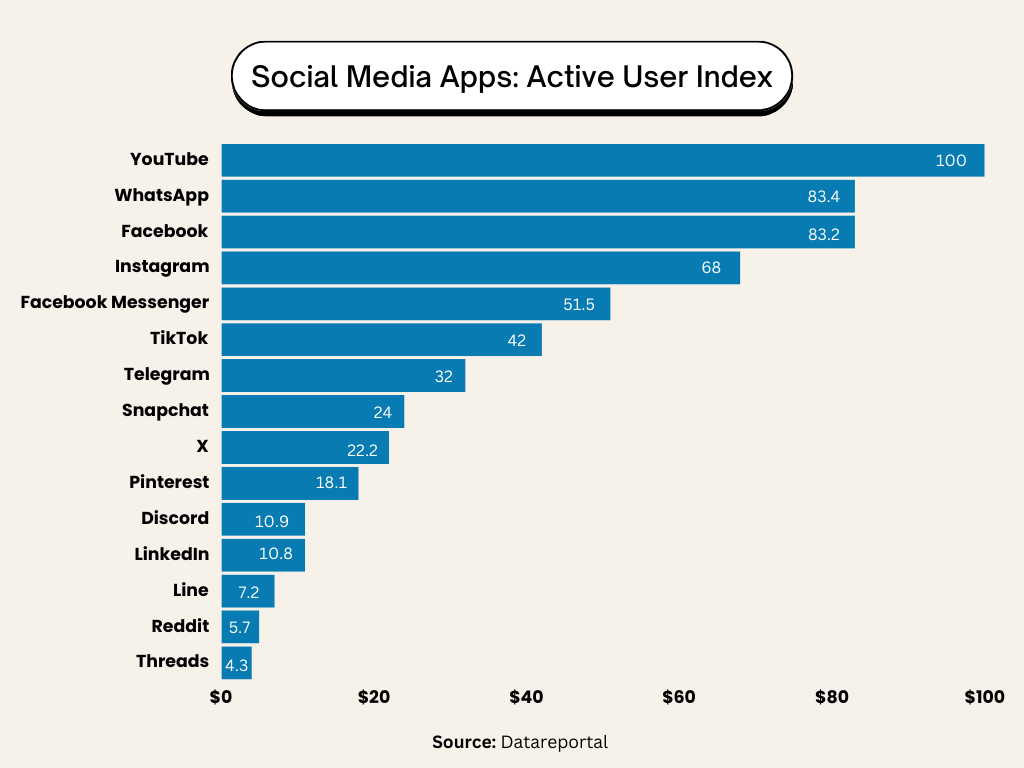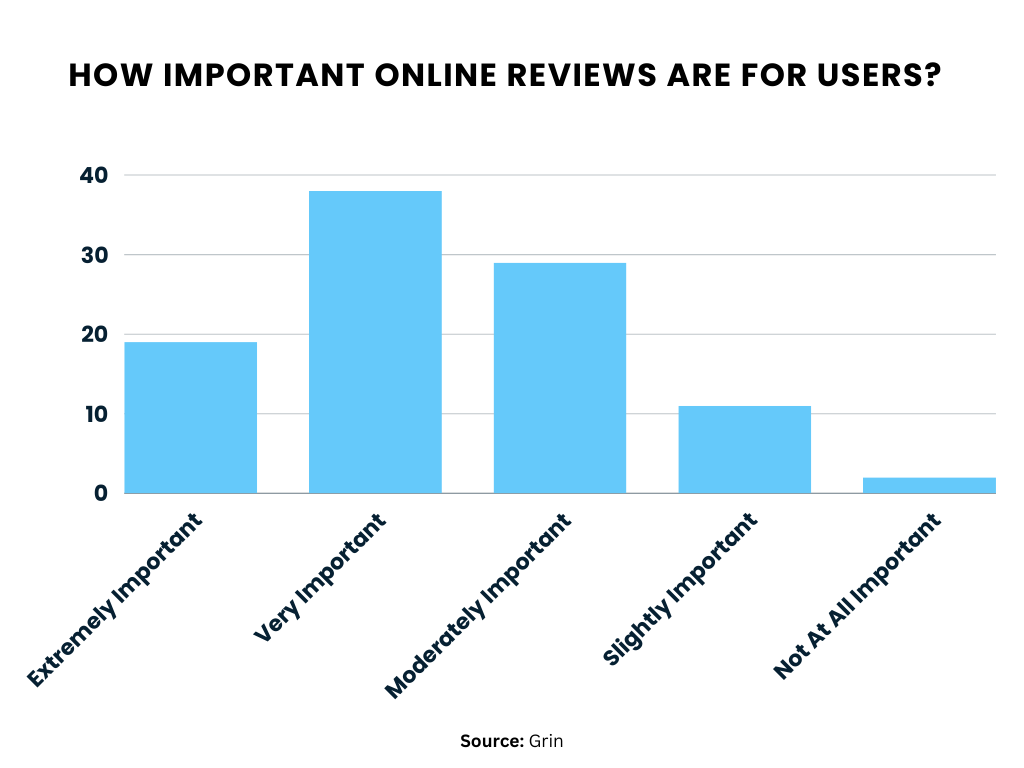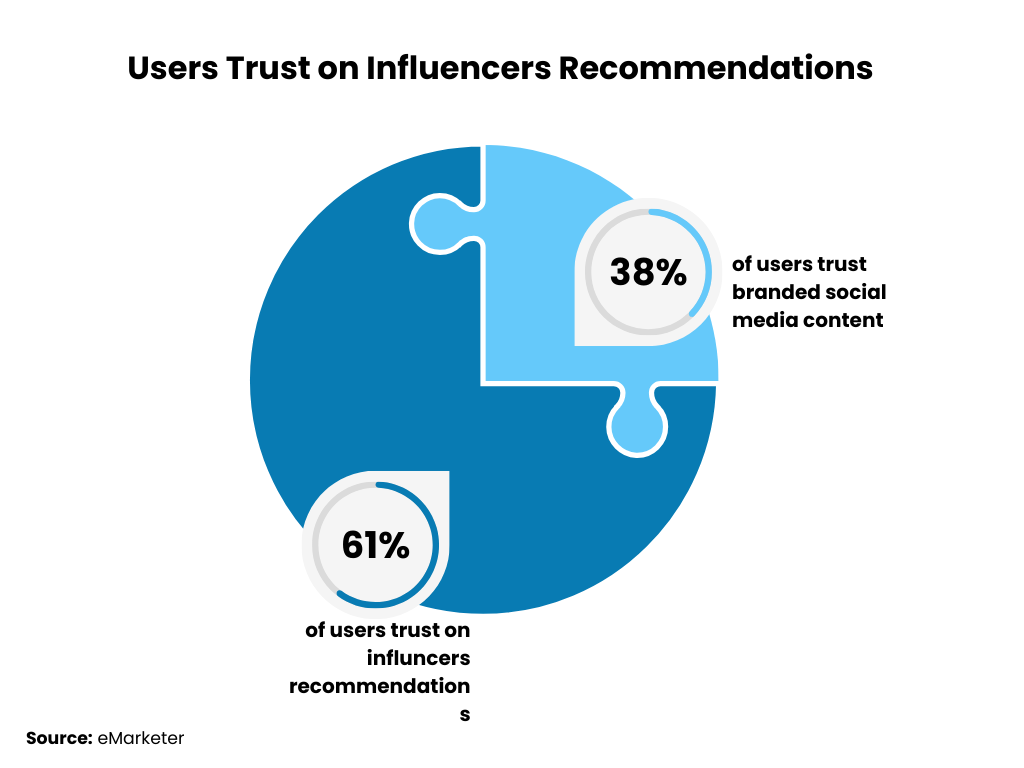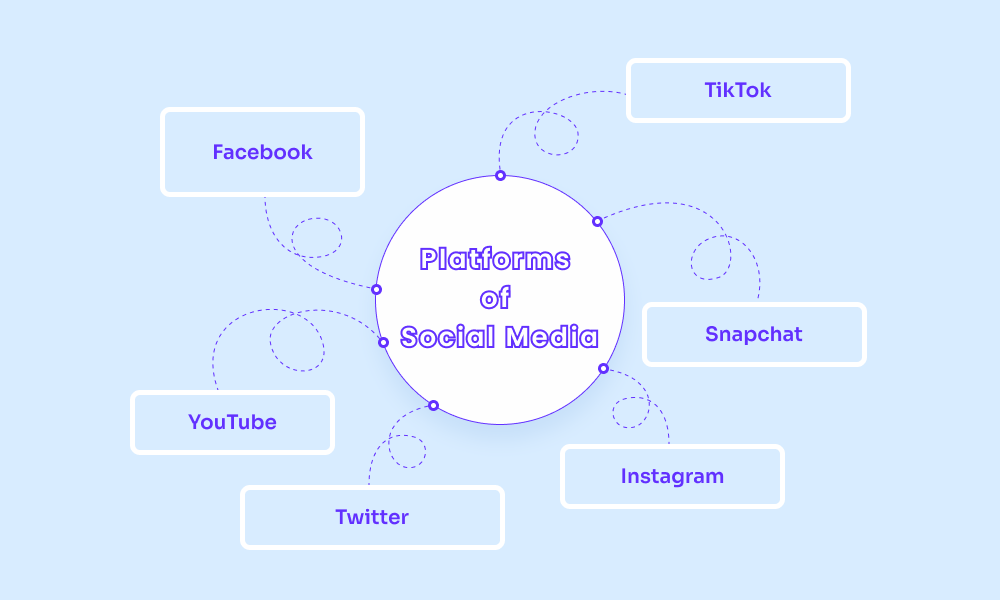2500+
Successful Projects

If you’re a frequent Facebook or Instagram user, you might have surely experienced how these platforms have evolved into marketing and promotional channels. Just 3 minutes on a video, and you will see an ad. While it may seem frustrating to some users, businesses have found it to be one of the best app promotion strategies. You can leverage these platforms to showcase your app's unique features, share user testimonials, and announce updates or new features.
Even in a recent survey, 62% of social media users have admitted that they became interested in brands after seeing their ads on social media. With that being said, you can also get insights and analytics that can help you understand your audience better and optimize your promotional strategies.
Table of Contents
Have you ever wondered what makes people buy from social media instead of purchasing directly from e-commerce sites? It’s probably because people use social media to share their experiences on product reviews, information about services, warnings against products, tips on using them, and much more. According to a BrightLocal report, 98% of users prefer reading online reviews before making a purchase. This opens up a huge opportunity for app marketers to promote their mobile app on social media before its launch to ensure it gets anticipated responses from the users. It is, in fact, the crucial stage of mobile app development.
If you’re looking for ways to leverage social media platforms for app promotion, this guide will present some of the best and most effective ways to do so.

Yes, indeed, your mobile app needs social media promotion to ensure it gets anticipated responses from the users after its launch. Leveraging social media for app promotions is probably one of the most effective app marketing strategies. If you’re still doubtful about whether social media will work for your mobile app marketing strategy, here are some potential benefits of social media promotions:
As said above, there are over 4.74 billion active social media users, which is roughly 65% of the world’s total population. Out of these numbers, each user spends an average of 30 minutes per day on social media, be it scrolling feeds, doing online shopping, or engaging with their favorite social media influencer.
With so much attention and a huge user base on social media, it doesn’t matter whether you’re targeting B2B or B2C businesses; one thing is clear: your audience is online.
But to leverage the ultimate advantages of social media, businesses must leverage different channels and should focus more on the content marketing aspect. Remember, an optimized content marketing strategy combined with a strategic app marketing plan will likely increase your ROI.
Today, there are tons of social media platforms, and each helps you in a unique way to reach your targeted audience. Below, we have listed some of the best and most effective ways to leverage social media platforms to promote an app.
Social media holds endless potential for app promotion and marketing. It is something you can't afford to overlook to stay competitive in this digital world. So now that you know the potential benefits of social media marketing, let’s move forward to have a look at some of the best ways to do so.

To maximize your mobile app's promotional potential, consider investing in paid social media advertising. Numerous social media platforms provide app installation advertising options, which can effectively enhance user engagement with your app. You have the freedom to select the platforms that best capture your target audience's attention.
Here are three popular paid social media advertising:
Recent data suggests that Google Ads drive nearly half of all mobile app downloads. With paid advertising accounting for 50% of advertising analytics and a steady decrease in organic reach across websites, it's become crucial for app developers to amplify their app's visibility through paid ads across various websites.
YouTube ads work in a similar fashion to other social media platforms. The key advantage of advertising on YouTube is its status as a mainstream media platform, having replaced television and traditional advertising mediums. Nowadays, audiences primarily receive exposure through YouTube. It offers you the opportunity to maintain a dedicated channel for regular video ad postings.
Sponsored posts represent another effective method to connect with your target audience. This approach is particularly successful on platforms like Instagram and Facebook, where you essentially pay the platform to promote your app to a specific audience demographic.
Social media platforms are not just for connecting with friends or like-minded people, but they also serve as a hub for various types of content, including news, events, and products. This makes them a crucial tool for social media marketing, where the goal is to produce captivating content that draws in your target audience.

If you're an app developer seeking to promote your mobile app, you will surely come across these two main strategies:
Your first option is to generate engaging content to make your users stay connected. The key is to promote your app in a way that addresses the questions and needs of your audience. Don't limit yourself to blog posts; diversify your content based on the platform you choose.
Alternatively, you can design a universal marketing campaign that fits all platforms. For example, if you have an app that provides a personal statement writing service in the UK, you could create brief, engaging videos showing individuals struggling with writing and then finding the solution through your app. This content can be effectively shared on both Instagram and YouTube.
In addition to creating your own content, you can also take advantage of user-generated content (UGC). UGC involves your users sharing photos, videos, or reviews about your app on their social media platforms, encouraging others to engage.
Research indicates that 90% of users are influenced by recommendations from their network, compared to only 33% who are swayed by advertisements. Given this high level of influence, using UGC to promote your app can be an effective way to increase visibility.
Lead generation is the ultimate goal of social media marketing strategy. Apart from marketing, it is also essentially a part of the sales process. The sales team is responsible for converting these leads into sales. A lead can be any user data, be it a phone number, address, ID, or demographics that help businesses target their intended audience.
Over the years, social media platforms have emerged as the best tools for collecting user data relevant to businesses and app marketers for generating quality leads. To do it effectively, you should align your business goals with your app marketing strategy and test them to see if they really work for you or just a waste of resources.
Reviews and ratings are the most reliable and probably the best way to promote your app and get it exposed to a wider audience. If we look at the Google Play Store, the platform shows genuine reviews and ratings of an individual app. It puts down the user’s reviews and a rating chart, with users sharing their real-life experiences of using it and rating them on a scale from 1-5, with 5 being the best rating a user can give. It gives potential users an idea of how effective and useful the app would be.

As an app marketer, you can leverage this data and highlight the best reviews and ratings to encourage new users to get more downloads. In case there are more negative reviews than positive ones, the best way to deal with them is to reply individually to all reviews and assure them you’ll fix the issues quickly.
As social media platforms continue to evolve, each carving out its unique niche, numerous trends have emerged and faded. However, one trend that has consistently gained traction since its inception is the use of hashtags. From Twitter to Instagram and even Google searches, hashtags have become a standard tool for finding virtually anything.
Businesses are now flexing their creative muscles to link memorable and catchy hashtags with their products, making them easily discoverable by the public. As a mobile app developer, you, too, can craft a unique and memorable hashtag and pair it with the power of social influencers.
Recently, Instagram influencers have become a popular and trusted medium for connecting brands with consumers. You can engage a well-known Instagram influencer who caters to an audience similar to your app's target demographic.
Request them to incorporate your app's hashtags in their posts promoting your app. For example, an influencer who orders food through the app could promote a food delivery app and use its hashtag in the post caption. This is an excellent illustration of how hashtags can harness social media influencers' power.

YouTubers stand apart from influencers on other platforms as they are recognized as social media influencers in a broader sense. They carry their audience across all platforms they engage with, making them a more valuable asset.
You can commission them to create a comprehensive review video of your app. They can appropriately title the video and include hashtags in the title to enhance its discoverability.

Each social media platform has its unique characteristics, even though they've started to adopt similar features. For influencers and regular users, these platforms aren't mutually exclusive. It's possible to have a substantial following on multiple platforms while being primarily known on just one.
This is a common scenario for many YouTubers who, while being recognized for their YouTube presence, also have a significant fanbase on Twitter and Instagram. Each platform has integrated advanced features, making them unique in their own ways. Here are some of the top social media platforms that can be leveraged to promote your mobile app:
Facebook is more than just a social media platform; it's the initiator that paved the way for all others. It was created with the aim of building virtual communities through the sharing of photos, content, and interests. It remains one of the largest platforms for businesses and products, like mobile apps, to cultivate their communities.
YouTube has revolutionized the monetization of video content through advertisements. It has replaced traditional media outlets like television and has become a primary platform for sharing a wide range of content, from entertainment to news. It's a popular choice for businesses and individuals to promote their brands, primarily through video content and community building.
Twitter, a microblogging site, gained popularity when high-profile celebrities joined the platform. Soon after Twitter's launch, the culture of expressing opinions through 'tweets' became a norm and continues to this day. Over time, Twitter introduced the trend of hashtags in tweets, making it a major platform for discussions among like-minded individuals, influential opinions, and trending news.
Instagram primarily operates through photos and images. It adopted and improved the features of stories and hashtags from its contemporaries. It also introduced IGTV for short video content. Today, Instagram is one of the largest social media platforms, offering a mix of features from other platforms. The platform has proven best for influencer marketing.
Snapchat introduced the feature of short video stories, which was later adopted by Instagram. Despite a controversial update that led to the departure of many influencers, Snapchat continues to host advertisements and content that can be used for product promotion.
TikTok, a relatively new player in the market, has been rapidly gaining popularity. It has simplified content creation and filled the gap between short and curated content while staying relevant. This has attracted many brands as it requires less effort to create content yet offers higher engagement than other platforms.
Finally, social media platforms are excellent avenues for providing rewards to your users. You can launch marketing campaigns that provide discount coupons, vouchers, gift cards, or other benefits for using your app. By using analytics, you can segment users from first-timers to long-term and sporadic ones and offer incentives accordingly.
Regardless of your app's category, there's a chance to attract new users by disseminating exclusive tips, hints, and educational materials.
Use these questions as a springboard to plan your social content.
Since Instagram doesn't allow product tagging for digital products, making the most of the link in your bio is crucial. As Instagram allows only one link in your bio, we suggest using a bio link tool, which enables you to guide your audience to unlimited resources. You can do it all if you want to link to the app download page, your website, or a YouTube video explaining why your app is superior.
Promoting your app on social media drives downloads and fosters and nurtures the community of existing app users, promotes word-of-mouth, and enhances retention.
Regardless of the success of your overall marketing campaign, new customer engagement and smart customer retention should not wane for a while after the launch. The SEO-friendly blogging campaign that was initiated earlier should persist.
Meanwhile, start reviewing customer comments and reviews to identify potential areas of weakness and understand the direction for the post-launch update phase.
Analytics and statistics can provide valuable insights, especially the DAU and MAU (Daily and Monthly Active Users), App Retention Rate (the duration users use your app before uninstalling), and ARPU (Average Revenue per User).
As stated earlier, these data points will help you understand your update priorities and identify overlooked bugs that need immediate attention.
Leveraging social media platforms for promotions isn’t a new phenomenon; its existence roots back to when Facebook introduced social ads in 2007. However, you will need to find ways to leverage social media platforms to promote your mobile app.
Do as much research as possible before you roll out your mobile app marketing strategy so you will know in advance who to target, where they live, and what action to take. Then, only you can create a working plan that works wonders for your app promotions.
Social media advertising can be optimized by targeting the right audience, using engaging content, and analyzing performance metrics. It's about creating ads that resonate with your audience and encourage interaction.
Social media can be used for promotion by sharing engaging content, interacting with followers, and running promotional campaigns. It's a platform to showcase your products/services and build relationships with customers.
To market an app on social media, share engaging app-related content, use targeted ads, and collaborate with influencers. Highlight the app's unique features and benefits to attract potential users.
The most effective way to use social media for app promotion is through targeted ads, influencer partnerships, and user-generated content. To keep your audience engaged, regularly update them about new features and updates.
Promote apps on social media by creating engaging posts about the app, running ad campaigns, and collaborating with influencers. Use analytics to understand user behavior and refine your strategy.